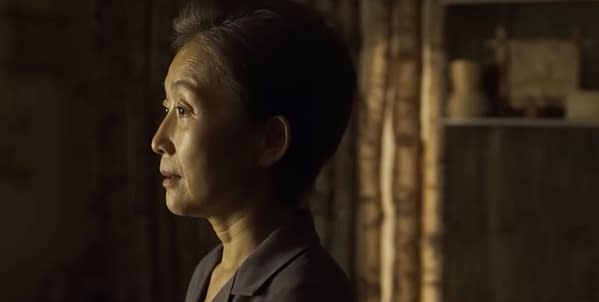Posted in: TV | Tagged: bisexual lighting, chinese science fiction, game of thrones, Liu Cixin, Red Wedding, The Three-Body Problem
The Three-Body Problem Ep. 4 Review: Time for Some Science Grandma
The fourth episode of The Three-Body Problem finally gives us Ye Wenjie, a major character also known to us as "Science Grandma."
It's become our daily ritual to watch a new episode of The Three-Body Problem. Might as well enjoy it while it lasts, which is thirty episodes in total, so one a day until it's over. It's a slow burn as it takes its time to cover the book in the first epic Science Fiction television series on Chinese television from an international bestselling book. There's a reason Liu Cixin is at the head of China's Science Fiction boom. His books point to what China aspires to: huge ambition, a forward vision, a reckoning with the past, and an arrow to the future. Ten million viewers for The Last of Us on HBO is impressive, but a hundred million viewers for The Three-Body Problem in China? That's a whole different ballgame. And still no coverage from any Western site.

So Wang Miao (Edward Zhang) is somehow still not having a good time with his hallucination of the countdown time code. He doesn't want to say what he's afraid of, that he might be marked for death like Yang Dong (He Du Zuan) and the other scientists in Beijing and across the world. He seems to get bathed in purple neon light a lot on this show, which is interesting considering to the LGBTQ community in the West, that's coded as "bisexual lighting". Given that LGBTQ characters are not allowed in Chinese movies or television, that raises so many questions. We'll assume the purple neon lighting on the show was chosen because it looked cool and eerie, for eerie is the prevailing mood of the series.
It's a mark of good casting and great actors who can convey what and who they are just by their look and their body language before they even start talking. Yu He Wei's Shi Qiang is brash, gruff, working class, and all cop, shoulders slumped with class resentment but full of street smarts and cunning. Zhang's Wang Miao is a hardcore introvert, naïve, self-preoccupied, and desperately self-protective, keeping his thoughts to himself because he knows people might not believe him from personal experience. The scene where his wife suggests he consult a psychiatrist feels like being gaslit. It's like everyone who ever coped with mental illness. He does what Shen Yu Fei (Li Xiao Ran) told him to do, which is to halt work on his development of the nanomaterial at his lab. He demands proof that some entity or power is doing this to him, and she tells him to watch for signs that the universe will flicker just for him in three days when work at his lab resumes. As a scientist, he needs to see evidence, but he's in way over his head with no other ideas. Ironically, it's asshole cop Shi Qiang who believes him. Shi Qiang discovered that all the dead scientists, including Yang Dao, spoke to Shen Yu Fei days before they died. And fifteen researchers and two nuclear physicists just died in a fire at a lab in North America.

"He's a Science Nerd, He's a Smartass Cop in the Edge – They Fight Crime!"
The reluctant buddy cop pairing of Wang and Shi is shaping up here as Shi is the only person he can talk about his fears with, extremely reluctantly. It was hinted at in the first episode, but the class divide between them is more pronounced now. Shi Qiang's working-class background and accent are the biggest contrast with Wang's middle-class elitist in the show, but Shi Qiang might be the smarter one. He's the one making the connections, but he doesn't have enough to arrest Shu Yu Fei. He knows that smart people like Wang can lack common sense and be really dumb – that might be why they keep dying. He knows that Wang knows he might be his best chance at survival at this point. And Wang's belligerence might make him a bigger asshole than Shi Qiang. Wang knows Science but Shi Qiang knows people, including at their worst.
Shi Qiang taunts Wang again: why is he going out of his way to investigate Yang Dao's death? Was he in love with her? Was she his muse? It's not healthy to be in love with a dead woman. Shi Qiang is using a common interrogation technique: piss someone off, and they might blurt out the truth before they can make up a lie. Wang admits he only ever met Yang Dao once. She's a colleague, a fellow scientist, and scientists committing suicide is a mystery he needs to solve. She just happened to be in the same city as him, so he chose to investigate her case like a scientist would. And how he's made himself a target.
The bottom line? They both know Wang is in big trouble.

Introducing Science Grandma
And then there is, at last, Wang Dao's mother, Ye Wenjie (Chen Jin). We've been seeing shots of her looking pensively into the distance like she's remembering past tragedies. She last spoke to Wang at her daughter's funeral. She's the neighbourhood grandma who babysits the local kids. Everyone loves her. She's also an astrophysicist, now retired. Wang visits her to ask about Wang Dao. Ye treats him like a nephew, inviting him to lunch and gifting him ginseng herbs for his stress like he's a regular visitor when this is his first time in her house. That's Asian moms for you. Chen Jin is another great actor who can tell you everything about her character without saying a thing. China seems to have a lot of those actors. Her face hints at past tragedies and pain. She's a survivor, and she talks about the tragedy of her daughter, a genius and science prodigy who lived for Science so finding that Physics doesn't exist is the worst thing that could possibly happen, possibly too much to bear.
As in a British murder mystery, the emergence of Ye Wenjie is like the introduction of the most important character in the investigation. Readers of The Three-Body Problem know how big she is to the story, but right now, she's Science Grandma and the character to offer a female perspective on the story. She's nothing but kind and helpful, making a call to one of the major observatories in the city for Wang to observe the phenomenon Shen Yu Fei told him to expect. It's Shi Qiang who points out that she's unnaturally calm about everything, even the death of her daughter when he watched her at the funeral. Science Grandma is way too calm about everything and maybe too helpful. That's a big tell in every mystery. Everyone's hiding something, especially the nicest ones. We're going to keep taking this show as it comes instead of leaping ahead to spoilers we know from the book. Why ruin the fun for people coming fresh to the story, like the trolls who spoiled the Red Wedding in Game of Thrones?
This Show Could be Twice the Pace and Half the Length
The pace of The Three-Body Problem stretches out the story to the point where the series feels twice as long as it should run. It might have had more impact if this was fifteen episodes instead of thirty, but the makers want the viewers to soak in the impending doom and gloom. For the ten people left in China who haven't read the book, maybe this show is full of suspense. The ending theme's lyrics already tease impending doom for humanity. Hell, the entire plot of the series is spoiled in the official synopsis. In the end, spoilers aren't the point, it's the journey, so we're taking this ride on its terms. But really, Science Grandma's first big scene should have come in the second episode. You can watch this episode through the YouTube link.














